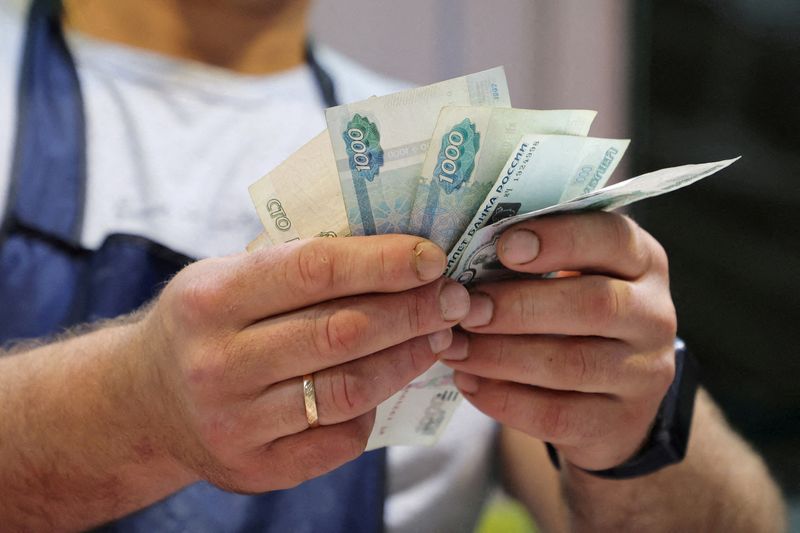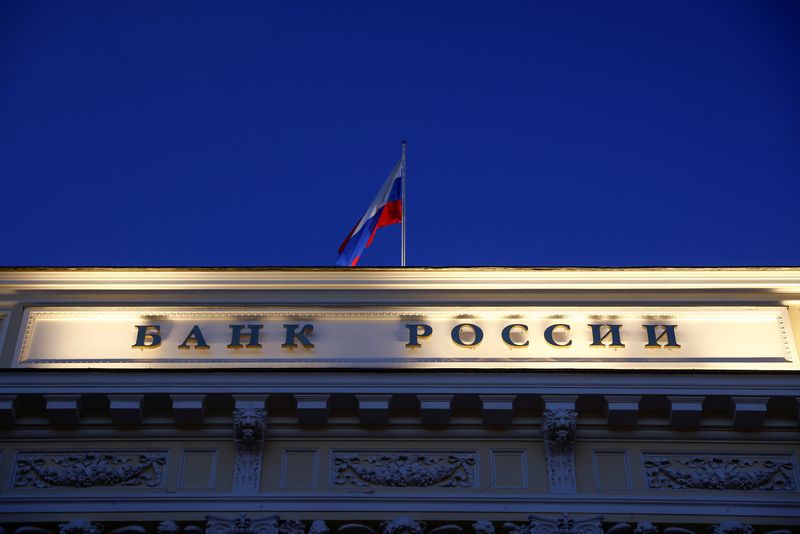MOSCOW (Reuters) -Russia's central bank hiked its key interest rate by 350 basis points to 12% on Tuesday, an emergency move to try and halt the rouble's recent slide after a public call from the Kremlin for tighter monetary policy.
The extraordinary rate meeting came after the rouble plummeted past the 100 threshold against the dollar on Monday, dragged down by the impact of Western sanctions on Russia's balance of trade and as military spending soars.
The rouble pared gains after the decision to stand 0.5% weaker at 98.16 by 1056 GMT, but still significantly above lows near 102 on Monday which had not been hit since the early weeks after Russia invaded Ukraine.
President Vladimir Putin's economic adviser Maxim (NASDAQ:MXIM) Oreshkin on Monday rebuked the central bank, blaming what he called its soft monetary policy for weakening the rouble.
Hours after Oreshkin's words, the bank announced the emergency meeting, throwing the currency a lifeline.
"Inflationary pressure is building up," the bank said in a statement on Tuesday.
"The pass-through of the rouble's depreciation to prices is gaining momentum and inflation expectations are on the rise."
Though stopping the rot, analysts largely agreed that the move would not have a long-lasting impact.
"As long as the war continues it just gets worse for Russia, the Russian economy and the rouble," said Timothy Ash, senior EM sovereign strategist at Bluebay Asset Management.
"Hiking policy rates won’t solve anything - they might temporarily slow the pace of depreciation of the rouble at the price of slower real GDP growth - unless the core problem, the war and sanctions are resolved."
ECONOMICS OR POLITICS?
In its original statement, the bank removed its usual hawkish guidance that it would consider future rate hikes, leading some analysts to speculate that interest rates had peaked.
But a little after the decision, the bank issued an additional statement: "In the case of strengthening pro-inflationary risks, an additional increase in the key rate is possible."
Central Bank Governor Elvira Nabiullina has won plaudits for her handling of the economy since Russia began what it calls a "special military operation" in Ukraine, but the plunging rouble and high inflation have put her on the back foot, especially among pro-war nationalists.
The Kremlin's public criticism of her monetary policy adds further pressure as Russia heads towards a presidential election in March 2024, with consumers battling rising prices for basic goods.
"While such a depreciation risks boosting inflation, it is also the signal it sends out to the Russian public about the costs of the invasion of Ukraine," said Stuart Cole, chief macro economist at Equiti Capital in London.
"As such, today's decision will likely have had an element of politics behind it as well as economics."
Andrei Melaschenko, economist at Renaissance Capital in Moscow, said the bank was right to react to inflation risks, but that the meeting, being announced so soon after Kremlin criticism, raised questions about the bank's independence.
"(Nabiullina) has built quite a strong team around her and the central bank has been a strong regulator and I think and the market, both the domestic and international market, sees it that way."
INFLATION PRESSURE
The bank last made an emergency rate hike in late February 2022 with a rate raise to 20% in the immediate fallout of Russia's despatching troops to Ukraine. The bank then steadily lowered the cost of borrowing to 7.5% as strong inflation pressure eased in the second half of 2022.
Since its last cut in September 2022, the bank had held rates but steadily increased its hawkish rhetoric, eventually hiking by 100 basis points to 8.5% at its last scheduled meeting in July. The next rate decision is due on Sept. 15.
Russia saw double-digit inflation in 2022 and after a deceleration in the spring of 2023 due to that high base effect, annual inflation is now above the central bank's 4% target once more and quickening.
In annualised terms on a seasonally adjusted basis, current price growth over the last three months amounted to 7.6% on average, the bank said.
Promsvyazbank analysts said an additional hike may be required if the rouble does not stabilise and that measures to reduce the rouble liquidity surplus were also needed.
'SLOW THE BLEEDING'
Russia's widening budget deficit and stark labour shortage have contributed to rising inflationary pressure this year, but the rouble's rapid slide from around 70 against the dollar at the start of the year to more than 100 on Monday pushed the central bank to act.
The bank, which blames the rouble's slide on Russia's shrinking current account surplus - down 85% year-on-year in January-July - has already tried to limit the rouble's decline.
Last week, it halted the finance ministry's FX purchases to try to reduce volatility, a step that effectively saw Russia abandon its budget rule. Analysts widely agreed that those measures alone were too minimal in scope to significantly support the currency.

"Today's rate hike will only temporarily slow the bleeding," said Liam Peach, senior emerging markets economist at Capital Economics in London.
"Russia will struggle to attract capital inflows because of sanctions," he said. "And there's little ammunition for FX intervention – the central bank has some unfrozen renminbi assets and gold reserves, but the bar for using these is likely to be high."
